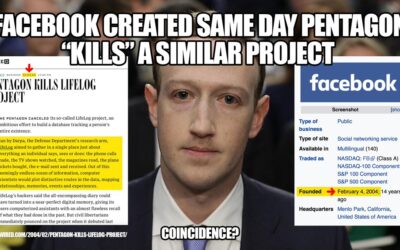|
||
|
16 April 2011. A sends: Roger Dingledine writes that the US Navy uses Tor for open source spying: http://idtrail.org/files/Dingledine%20-%20Tor.pdf 28 March 2011. Add comments from 1997 on TOR, called then the Onion Router. 25 March 2011. Add messages from A3 and JY. 24 March 2011. Add message from A and EFF.
22 March 2011 Creators of TOR: More: http://www.onion-router.net/Publications/IH-1996.pdf
TOR Made for USG Open Source Spying Says MakerDate: Tue, 22 Mar 2011 16:57:39 -0400 From: Michael Reed <reed[at]inet.org> To: tor-talk[at]lists.torproject.org Subject: Re: [tor-talk] Iran cracks down on web dissident technology On 03/22/2011 12:08 PM, Watson Ladd wrote: > On Tue, Mar 22, 2011 at 11:23 AM, Joe Btfsplk<joebtfsplk[at]gmx.com> wrote: >> Why would any govt create something their enemies can easily use against >> them, then continue funding it once they know it helps the enemy, if a govt >> has absolutely no control over it? It's that simple. It would seem a very >> bad idea. Stop looking at it from a conspiracy standpoint& consider it as >> a common sense question. > Because it helps the government as well. An anonymity network that > only the US government uses is fairly useless. One that everyone uses > is much more useful, and if your enemies use it as well that's very > good, because then they can't cut off access without undoing their own > work. BINGO, we have a winner! The original *QUESTION* posed that led to the invention of Onion Routing was, "Can we build a system that allows for bi-directional communications over the Internet where the source and destination cannot be determined by a mid-point?" The *PURPOSE* was for DoD / Intelligence usage (open source intelligence gathering, covering of forward deployed assets, whatever). Not helping dissidents in repressive countries. Not assisting criminals in covering their electronic tracks. Not helping bit-torrent users avoid MPAA/RIAA prosecution. Not giving a 10 year old a way to bypass an anti-porn filter. Of course, we knew those would be other unavoidable uses for the technology, but that was immaterial to the problem at hand we were trying to solve (and if those uses were going to give us more cover traffic to better hide what we wanted to use the network for, all the better...I once told a flag officer that much to his chagrin). I should know, I was the recipient of that question from David, and Paul was brought into the mix a few days later after I had sketched out a basic (flawed) design for the original Onion Routing. The short answer to your question of "Why would the government do this?" is because it is in the best interests of some parts of the government to have this capability... Now enough of the conspiracy theories... -Michael _______________________________________________ tor-talk mailing list tor-talk[at]lists.torproject.org 24 March 2011 A sends: From: A Date: Thu, 24 Mar 2011 01:41:41 +0000 Subject: Cryptome Fwd: Re: Fwd: The onion TOR network To: cryptome[at]earthlink.net Following the publication of the email extract on TOR, I asked the EFF what they made of it. Here it is. You can of course publish it. ---------- Forwarded message ---------- From: Rebecca Jeschke <rebecca[at]eff.org> Date: 23 March 2011 21:29 Subject: Fwd: Re: Fwd: The onion TOR network To: A Hi A. This is from Senior Staff Technologist Seth Schoen. Thanks -- Rebecca -------- Original Message -------- Subject: Re: Fwd: The onion TOR network Date: Wed, 23 Mar 2011 11:15:24 -0700 From: Seth David Schoen <schoen[at]eff.org> To: Rebecca Jeschke <rebecca[at]eff.org> CC: chris <chris[at]eff.org>, Peter Eckersley <pde[at]eff.org>, Seth Schoen <schoen[at]eff.org> Rebecca Jeschke writes: any thoughts on this? It's totally true that the military people who invented Tor were thinking about how to create a system that would protect military communications. The current iteration of that is described at https://www.torproject.org/about/torusers.html.en#military right on the Tor home page. However, the Tor developers also became clear early on that the system wouldn't protect military communications well unless it had a very diverse set of users. Elsewhere in that same e-mail discussion, Mike Perry (a current Tor developer) alludes to this: https://lists.torproject.org/pipermail/tor-talk/2011-March/019898.html In fact, the best known way we have right now to improve anonymity is to support more users, and more *types* of users. See: http://www.freehaven.net/doc/wupss04/usability.pdf http://freehaven.net/~arma/slides-weis06.pdf The first link is to a paper called "Anonymity Loves Company", which explains the issue this way: No organization can build this infrastructure for its own sole use. If a single corporation or government agency were to build a private network to protect its operations, any connections entering or leaving that network would be obviously linkable to the controlling organization. The members and operations of that agency would be easier, not harder, to distinguish. Thus, to provide anonymity to any of its users, the network must accept traffic from external users, so the various user groups can blend together. You can read the entire (ongoing) discussion about government funding for Tor development via https://lists.torproject.org/pipermail/tor-talk/2011-March/thread.html (search for "[tor-talk] Iran cracks down on web dissident technology"). -- Seth Schoen Senior Staff Technologist schoen[at]eff.org Electronic Frontier Foundation https://www.eff.org/ 454 Shotwell Street, San Francisco, CA 94110 +1 415 436 9333 x107 Subject: Re: [tor-talk] Iran cracks down on web dissident technology From: A3 To: John Young <jya[at]pipeline.com> Cc: A2, cypherpunks[at]al-qaeda.net On Tue, 2011-03-22 at 17:43 -0400, John Young wrote: > Fucking amazing admission. No conspiracy theory needed. Wasn't this already very common knowledge? Subject: Re: [tor-talk] Iran cracks down on web dissident technology To: A3, A2, cypherpunks[at]al-qaeda.net From: John Young <jya[at]pipeline.com> That's what the Eff-folks advocating TOR are saying. And point to a file on Torproject.org. See: http://cryptome.org/0003/tor-spy.htm However, this appears to be a giant evasion perhaps a subterfuge, even reminds of what Big Boys say when customers learn they are siphoning customer data. Read the privacy policy the lawyer-advised apologists bark, and upon reading the privacy policy see that it only emphasizes the subterfuge. Openly admitting siphoning is supposed to make it okay because everyone does it under cover of lockstep privacy policy. Reject that. If the Tor operators really know what they are being used for, then they should admit to being agents of the USG, as Michael Reed had the guts to do. Claiming this US spying role for Tor is well known is a crock of slop, but then spies lie all the time and care not a whit that they peddle shit for eaters of it. If you believe them and like what they do then don't shilly-shally, just do what Michael Reed did but others are too ashamed to do after having been duped since 1996. If Reed's precedent for honesty is followed, there will be an admission that the Internet was invented for spying by its inventor. And then cryptography and other comsec tools. And then cellphones and the like. Hold on now, this is getting out of hand, the apologists will bellow, everybody has always known that there is no privacy in digital world. Actually, no, they did not. And those who knew keep their Janusian mouths writhing to reap the rewards of deception. Now that is a truth everyone knows. No conspiracy theory needed. |
| http://cryptome.org/jya/onion.htm25 April 1997: Add Lucky Green’s comments. 3 March 1997 (Thanks to LG for pointer) Date: Sun, 02 Mar 1997 18:20:49 -0800 At the FC’97 rump session, Paul Syverson from NRL presented a paper titled “Onion Routing”. The description of the system sounds very much like Wei Dai’s PipeNet. However, the development team seems to be unaware of PipeNet and the discussions about it that we had in the past. NLR has currently five machines implementing the protocol. Connection setup time is claimed to be 500 ms. They are looking for volunteers to run “Onion Routers”. It appears the US military wants to access websites without giving away the fact that they are accessing the sites and is looking to us to provide the cover traffic. What a fortunate situation. They said that the source would soon be on the web page, but so far it has not appeared. http://www.itd.nrl.navy.mil/ITD/5540/projects/onion-routing/
To: cypherpunks[at]cyberpass.net At 12:59 PM 4/20/97 -0700, Steve Schear wrote: >Hal, Neither one of them is any good in its present form. The folks at the FC’97 rump session got to watch Jim and myself poke truck sized holes into the NRL design within seconds of them ending their presentation. :-) Here was a US military research lab presenting a system they thought would give them a way to surf the Net anonymously by using the public for cover traffic. [Let me just spell out here that I believe that the people from NRL and Cypherpunks are on the same side on this issue. Their concern is COMSEC, not SIGINT.] Anyway, we knew how to crack their system without even having to think about it, since folks on Cypherpunks, especially Wei Dai, had discovered various venues of attack on such systems long ago. Cypherpunks are teaching the military about traffic analysis. :-) The one good thing about NRL is that they seem to be willing to learn. [The other being that they get paid to write our code for us.] Though I get the distinct feeling that they don’t like the required solution. There is simply no way to harden the system against attack without using a constant or at least slowly varying (I would guess we are talking about periods of several hours here, certainly not minutes, but I haven’t done the math, nor do I have the time to do so) bandwidth data stream between the end user and the first Onion Router. This will invariably require special software on the end user’s machine. I think the best design would be a client side proxy. [That much Crowds got right.] As to Crowds, they got to be kidding. How many end users are willing to become, even without their direct knowledge, the last hop to <enter evil URL here>? I believe that relatively few users would want their IP address to be the one showing up in the server log of <enter seized machine’s name here> because their jondo happened to be the exit point chosen.
— Lucky Green <mailto:shamrock[at]netcom.com> PGP encrypted mail preferred
|



